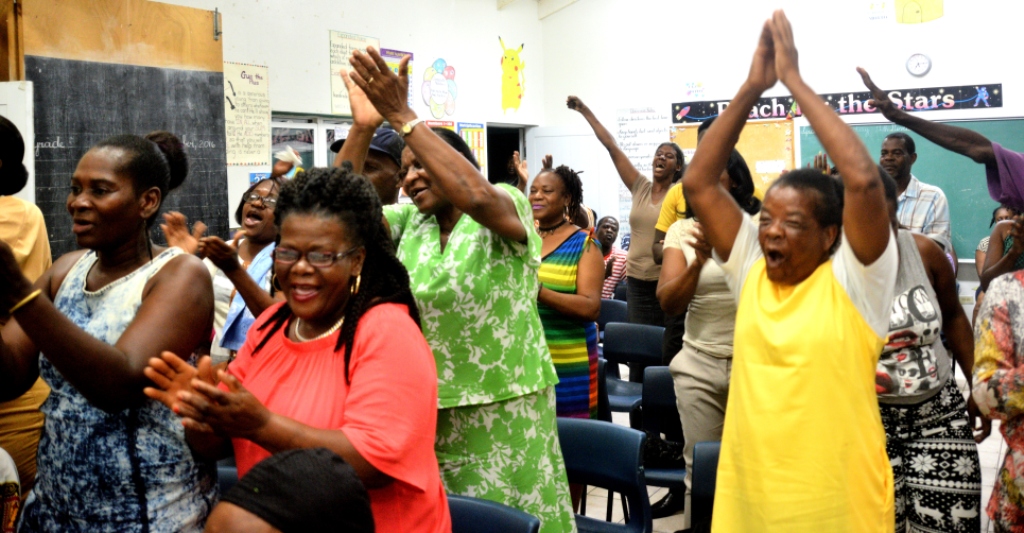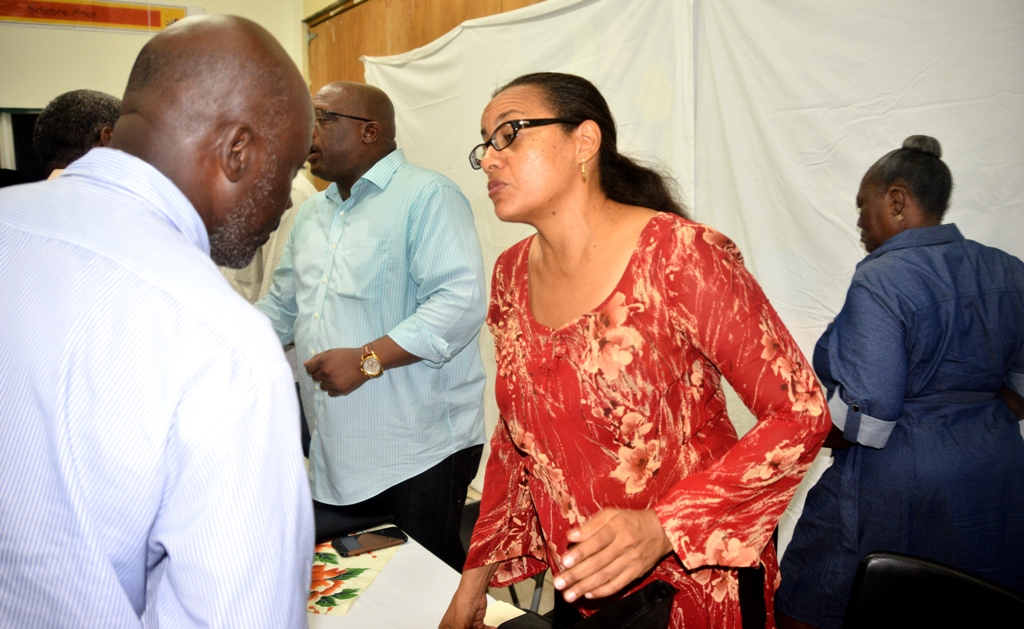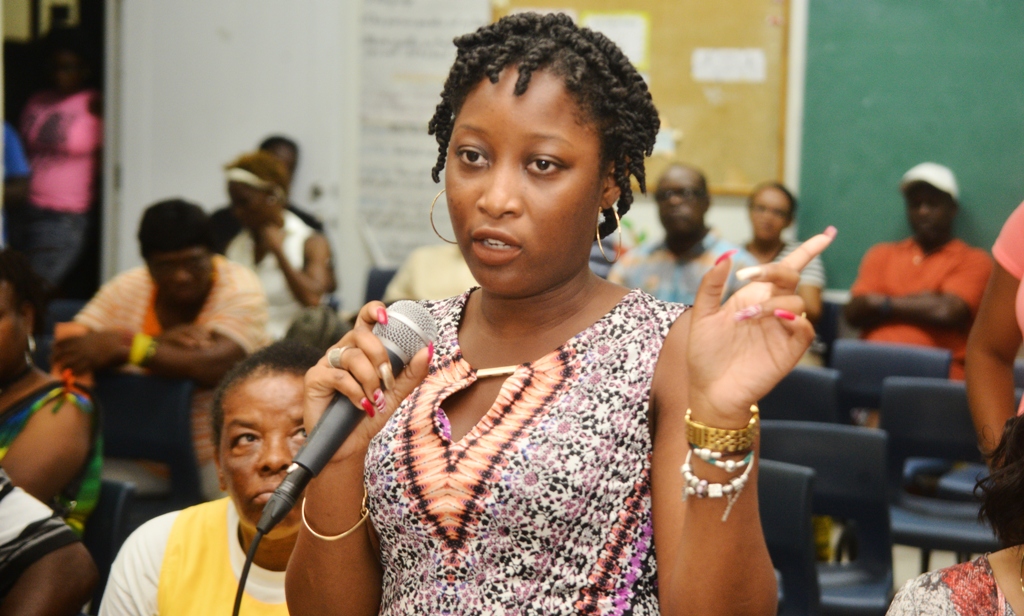Willet Photo Studio 1: (Right) Sen. and Min. of State responsible for Health, Hon. Wendy Phipps listens attentively as audience member shares concerns
Basseterre, St. Kitts, November 17, 2016 (SKNIS): “When it comes to the healthcare of the people of this country nothing is too expensive.” These were the words of Senator and Minister of State responsible for Health, Honourable Wendy Phipps, when revealing that the cost of the medication that is needed to treat Guillain Barré Syndrome, a rare effect of the Zika virus, is US$213 per vial.
She revealed this at a town hall meeting held in Lodge on Sunday (November 13), noting that several vials would be needed to be inserted into one Intravenous therapy (IV) for one patient.
“In preparation for more of those types of cases, we have also entered an arrangement with PAHO [Pan American Health Organisation] using their strategic fund to be able to bring in a drug that helps us treat the issue of paralysis,” Minister of State Phipps said. “It’s a drug by the big name immunoglobulin, which you don’t need to remember, but what you need to remember is that the drug is very expensive because it is costing the government US$213 per vial. We now have that drug here, it is meant to be diluted in the IV, so there might be several doses in one bottle.”
Willet Photo Studio 2: Resident of the area shares her concerns at the Lodge Town Hall Meeting
Guillain Barré Syndrome, according to the Centres for Disease Control and Prevention (CDC), is an uncommon sickness of the nervous system in which a person’s own immune system damages the nerve cells, causing muscle weakness, and sometimes, paralysis.
Minister of State Phipps informed that one resident of St. Kitts and Nevis had previously contracted Guillain Barré Syndrome and had to be sent to Puerto Rico for medical attention. She outlined that since that since that first confirmed case, the Ministry of Health had received 35 vials of immunoglobulin from PAHO, which she said had arrived 24 hours following the request. She outlined that should more cases of the condition turn up in the Federation, appropriate preparations were being made. These include expanding the Intensive Care Unit (ICU) from its current four-room capacity to incorporate four more auxiliary rooms, in close proximity, capable of housing less serious cases. This is necessary because Guillain Barré Syndrome patients have to be treated in the ICU.
Minister Phipps said that there had been no instances of microcephaly in the Federation thus far.
“We have also not had any instances where we have pregnant women infected by Zika ending up with babies with tiny heads,” Minister Phipps said, noting that the Ministry of Health was happy about that because it is another rare effect of the contraction of Zika which adversely affects the development of the child, “which means that those children will not live a normal life; they will be born as we say in local language, retarded. Which means that their growth will be stunted; they will be smaller than other children their age; their mental ability will be restricted and it means that’s a child you have to look after from the time it comes out until the time it dies, because the child will not be able to do too many functions on its own.”
Senator Phipps said that in September this year there had been the first three confirmed Zika cases in the Federation. She updated that as of the previous week, the Caribbean Public Health Agency (CARPHA), the entity to which samples are sent for testing, had confirmed 26 cases of Zika in the Federation, with only one positive sample coming from Nevis.
She called on residents to do their part to reduce the breeding sites of the chief agent of the spread of Zika, the Aedes aegypti mosquito, by removing receptacles that can hold stagnant water, using window screens or mosquito nets, and insect repellant.
She elaborated, that in the previous week, the government also received an internal update pertaining to Zika.
Willet Photo Studio 3: Attendees of the Lodge Town Hall Meeting jubilantly welcome Prime Minister Dr. the Honourable Timothy Harris
“When we got this report of the 26 cases last week, we also got confirmation that we have 516 suspected cases,” Minister of State Phipps said. “What do I mean by a suspected case? It means that when you presented with the illness, it appeared to be that, but maybe if your test has not gone off yet, we still can’t say no. At the same time, the Caribbean Public Health Agency has been swamped with all of these test requirements from around the 13 CARICOM-member states and are saying, please do not send us more than five tests to test in one shipment. ‘But where you have pregnant women, and other vulnerable groups like the elderly, send us all of the samples.”
The Minister of State explained that the reason CARPHA was now selective in the number of samples tested was because of the understanding that once doctors had become more familiar with the symptoms of the Zika, there would be no need to test every case.
Zika presents with flu-like symptoms that may include fever, head and body aches, sometimes along with an itchy rash and conjunctivitis, commonly referred to as red eye.
-30-











